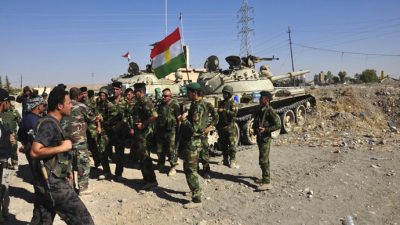Reuters photo
By
Tom Arms
Bye bye Kurds. That is the realpolitik message expected to be issued soon by the White House to one of the world’s saddest nationalities. It may not be as explicit as that, but the meaning will be clear.
According to Turkish President Recep Tayyip Erdogan—well known scourge of the Kurds—he has suggested to President Barack Obama that America and Turkey join forces to crush the terrorists in Syria. Obama is mulling it over. The problem is that in Washington terrorists means ISIS. In Ankara it means Kurds.
The Kurds have been around as an entity since the tenth century. Their ranks include the chivalrous Muslim crusader Saladdin, much-respected arch-foe of Richard the Lionhearted. In the 13th century they merited a positive mention in Marco Polo’s travelogues when he passed through on his way to China.
Throughout history they have had the misfortune to occupy a squeezed landlocked plot between Turkey, Persia and whomever sat in Baghdad. This basically meant a constant round of battles as Kurdish leaders sided with one empire or the other. But in between battles the Kurds were pretty much left to their own devices—until the 20th century.
In common with the rest of the world, the Kurds suffered an acute bout of nationalism. Unfortunately, so did their larger neighbours. During World War I the Kurds sided with the British against the Ottoman Empire. In return the then world’s greatest power promised to act as guarantors of Kurdish freedom. A promise they broke and the Kurds entered a 100-year struggle against suppression of their language, cultural identity and political freedom against Turkish, Iranian, Syrian and Iraqi governments. Particularly tiresome was Turkey, where half of the world’s Kurds live.
Then came the US-led Second Iraq War, the Syrian civil war, the establishment of the Caliphate and the West’s battle against ISIS. This was another opportunity for the Kurds to ally themselves with the newest world’s greatest power.
Members of the Kurdish security forces take part during an intensive security deployment after clashes with militants of the Islamic State, in Jalawla, Diyala province. Reuters photo.
After the debacle of Iraq President Obama has been understandably wary of committing American ground forces in the battle against ISIS. But one of the military truths is that air strikes, missile strikes and blockades do not, on their own, win wars. As soon as the air strike starts the besieged fighters simply go underground and re-emerge to fight again when the planes fly away. To win you need boots on the ground. The Kurds offered proxy boots.
The Western-supplied Kurdish fighters have done a reasonable—but not definitive—job. Meanwhile Turkey has seethed. How could their long-standing chief NATO ally back a group that wants to carve out a huge chunk of South Eastern Turkey and call it their own?
Then came the failed military coup. How dare the US and EU criticise Erdogan’s human rights record? Why won’t they extradite back to Turkey whomever Erdogan demands? Where are the messages of support? So Erdogan flies to Moscow to meet with Putin, just to show that is not afraid to find new friends. Military chiefs, Kerry, Biden—in ascending order—were all hastily dispatched to Ankara to mend fences.
The fact is that the US needs Turkey more than it needs the Kurds. The kiss of death for the Kurds was Erdogan’s decision on August 24 to climb off the fence in the Syrian Civil war and the battle against ISIS. On that day—after another ISIS suicide bombing in Turkey—he ordered Turkish tanks across the Syrian border.
Washington has to think geopolitically. It cannot afford to make Kurdish autonomy their objective unless that autonomy is vital to the larger objective of the defeat of ISIS and the retention of US influence in the Middle East. An army of 2,533 state-of-the art tanks backed up by 610,000 troops are much more likely to achieve that aim than 200,000 Kurdish guerrilla fighters.
And the Kurds? Well, they would be well advised to carefully consider Psalm 146, verse three of the King James Bible: “Put not your faith in princes.”
Tom Arms broadcasts on world affairs for a number of US radio stations including WTKF, all of which can also be heard on LookAhead News. His Weekly Viewpoints discussion programme can be heard at 1830 EST on Wednesdays and his LookAhead at the next week’s main events on Fridays at 1800.
LookAhead Radio World Report for week commencing 12 September:




No Comments Yet!
You can be first to comment this post!